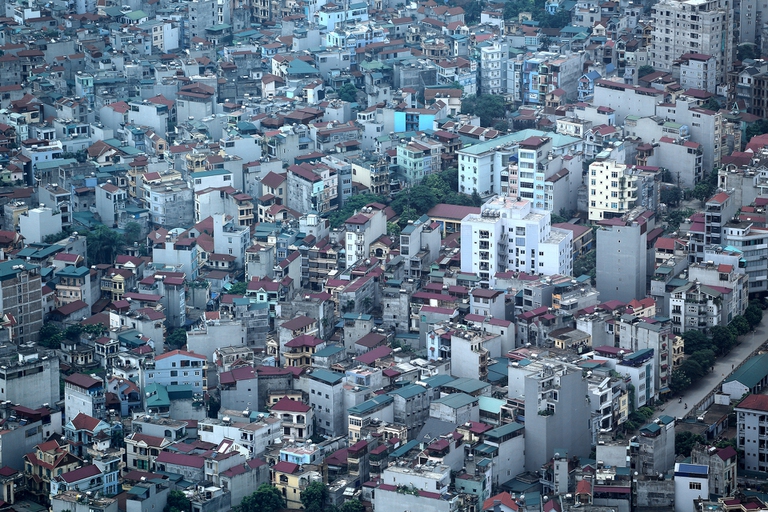https://www.lifegate.it/transizione-energetica-vietnam-g7
- |
- The G7 promises 15.5 billion dollars to Vietnam to promote the abandonment of coal and the production of energy from renewable sources.
- The agreement, to which the public and private sectors will contribute equally, adopts the same criteria as those recently signed with South Africa and Indonesia.
- The agreement reflects the desire to stimulate the energy transition among developing economies, which on the other hand risk seeing their country's debt increase.
After doing the same with South Africa And Indonesia, The G7 promises to Vietnam 15.5 billion dollars (14.6 billion euros) to push it to eliminate consumption coal.Hanoi, in turn, is committed to respecting the objective of achieving the net zero emissions by 2050. A collective effort to protect the Planet, where the countries most rich support and accelerate the energy transition path of developing economies.
What does the agreement between the G7 countries and Vietnam provide?
The agreement reached provides that half of the amount put forward by the Group of 7, made up of Canada, France, Germany, Japan, Italy, the United Kingdom and the United States, comes from public sector and half from the private one.This last slice, which will be paid in the form of loans, predominantly, and of non-repayable contributions, is awaited by financiers and investors who are part of the Glasgow financial alliance for net zero, a coalition of more than 500 financial institutions, including Citibank, Deutsche Bank, Hsbc and Standard Chartered.Initially the funding will come from Asian Development Bank and from International financial company.
Specifically, the amount put in place by the G7 will be disbursed over the next five years and will help Vietnam to bring forward by five years - from 2035 to 2030 - the reaching the peak of greenhouse gas emissions and to limit the peak coal capacity at 30.2 gigawatts (GW) instead of the 37 GW initially planned, all to slow down the continuation or start of highly polluting projects, reports the British news agency Reuters.
In doing so, Vietnam, among the 20 largest coal consumers in the world, will be encouraged to increase the use of renewable sources.In exchange for this generous offer, which Western negotiators (led by the European Union and Great Britain) have progressively increased to convince Hanoi, Vietnam has agreed to limit its overall emissions from the energy sector 240 to 170 megatonnes of carbon dioxide per year by 2030.And to generate just under half of the electricity from renewable sources, compared to the current target of 36 percent, as explained by the Financial Times.

A (hoped for) turning point in the country's coal drift
At the end of August, Vietnam inaugurated a new coal-fired power plant, the Nghi Son 2.During the ceremony, the project director stated that the plant would 1.2 gigawatts (GW) would have favored "a green operation" and helped the country meet the commitment to achieve net zero emissions by 2050, made by Prime Minister Pham Minh Chinh at the climate talks in Glasgow, COP26.
In the latest draft of Vietnam's energy development plan, in the eighth update (PDP8), the prohibition to start new coal-related projects after 2026.Furthermore, the highly carbon-intensive energy path undertaken by the country is indicated as the mostbalanced“.There are nine projects at stake for a total of 9,450 MW.
$44 billion for the energy transition of South Africa, Indonesia and Vietnam
Many satisfied voices.Also supporting the agreement Denmark And Norway and all theEuropean Union.Give it to him United States the president's appreciation arrived Joe Biden who, in a press note, stated:“Vietnam has demonstrated that it is at the forefront of charting an ambitious energy transition that will ensure long-term energy security.”A decision that reflects the country's "seriousness in achieving a green transformation for its people", he remarked John Kerry, US climate envoy and former Secretary of State.
These agreements represent a “crucial tool” to “unlock the emissions cuts the world needs in the 2020s,” the UN Secretary-General said, António Guterres.
The agreement is part of a broader package of measures – amounting to a total of 44 billion dollars, i.e. 41.4 billion euros – aimed at encouraging developing economies to progressively reduce the use of fossil fuels, until they become independent.The criteria are common to the agreements reached with the South Africa and theIndonesia.In the first case, an agreement was signed worth 8.5 billion dollars (8 billion euros);for the second, which came to life at the meeting of G20 in Bali, the amount is 20 billion dollars (18.8 billion euros), half of which comes from public funds.
Like what is planned for Vietnam, these resources are aimed at stimulating the closure of coal plants and bringing forward the peak of emissions in the sector by seven years, to 2030.Yet, there is no shortage of doubts and criticisms.In fact, last month the South African government of Cyril Ramaphosa stated that the structure of the $8.5 billion financial package is only 4 percent grants and mostly grants loans sovereign and multilateral.A risk for the country, because it would see the debt burden increase.
